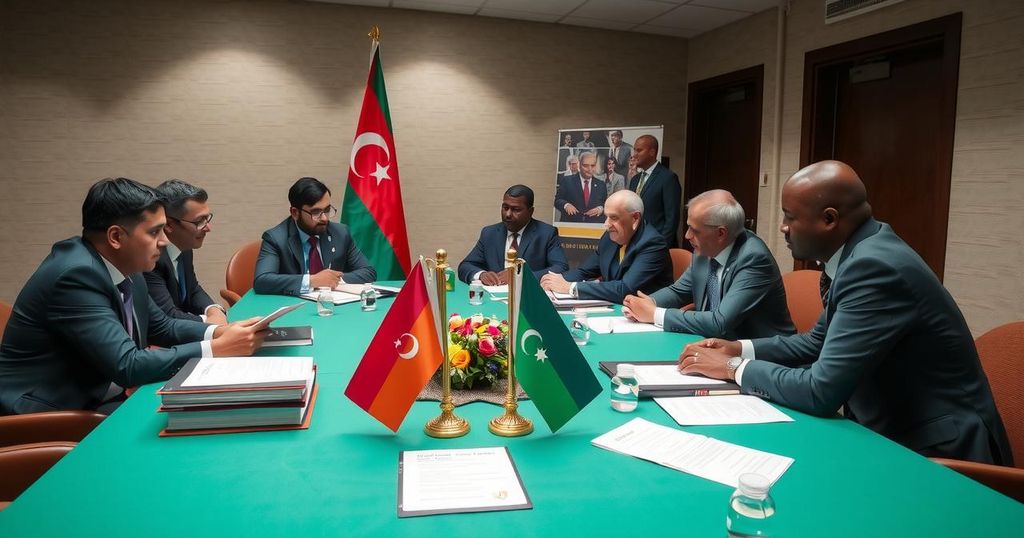The UN has unveiled a plan to tackle the political crisis in Libya by facilitating presidential elections and restoring institutional legitimacy. Deputy Special Representative Stephanie Koury outlined the establishment of an advisory committee to refine electoral laws and promote inclusive dialogue. The initiative aims to build consensus amid longstanding divisions, with Koury emphasizing the urgent need for elections and the importance of international support in achieving political stabilization.
The United Nations has introduced a strategic plan aimed at resolving the ongoing political deadlock in Libya, aiming to facilitate the long-anticipated presidential elections and restore the legitimacy of its governing institutions. Deputy Special Representative for Libya, Stephanie Koury, presented this initiative, detailing the establishment of an advisory committee composed of experts and respected personalities from diverse political, social, and cultural backgrounds. This committee will review unresolved issues related to electoral laws and propose a comprehensive roadmap for the elections.
UNSMIL intends to collaborate with local partners to initiate a structured dialogue that consolidates agreement on a unified national vision. A key priority will be to ensure equal and meaningful participation from all societal segments, particularly women and youth, fostering inclusivity and enhancing political legitimacy. Koury expressed hope that this initiative could also support the eventual constitution-making process.
Libya has faced significant political instability since the fall of Muammar Gaddafi in 2011, becoming divided between two rival governments, the Government of National Unity in the northwest and the Government of National Stability in the east. Scheduled elections for December 2021 were cancelled due to candidate eligibility disputes, further exacerbating public frustration.
Recognizing the Libyan populace’s desire for national elections, Koury highlighted the successful local elections conducted in November and emphasized the urgent need for broad national consensus to meet the citizens’ aspirations. She acknowledged the challenges posed by entrenched political divisions and instability but remained optimistic about the potential for change, contingent on political will from Libyan leaders.
Koury also addressed existing issues such as arbitrary arrests and regional instabilities that hinder progress, urging for transparency in investigations and access for UNSMIL to detention centers. With violence subsiding but political unrest persisting, she called upon the international community to support Libya’s journey towards stability and peace, stressing the importance of joint efforts from both national and international stakeholders.
In sum, Libya’s path forward hinges on the establishment of dialogue, unity, and a committed focus on democratic processes, ensuring that the population’s voice is integral to the governance structure.
The situation in Libya has been characterized by political turmoil since the ouster of long-time leader Muammar Gaddafi in 2011. The country is currently divided between two rival governments that emerged after a civil conflict: the Government of National Unity recognized internationally based in the northwest and the Government of National Stability located in the east. The UN’s intervention aims to resolve this impasse and facilitate the long-awaited presidential elections, which were initially scheduled for December 2021 but were postponed due to various disputes, notably regarding candidate eligibility. With an increasing urgency from Libyans for elections and a clear desire for a more unified governance framework, the UN’s role becomes critical in fostering dialogue and inclusivity while addressing underlying challenges such as arbitrary detentions and regional instabilities stemming from external conflicts.
The UN’s newly announced plan represents a crucial step towards resolving Libya’s political impasse and rebuilding trust in its institutions. By establishing an advisory committee focused on electoral laws and promoting a structured dialogue that incorporates diverse societal voices, including youth and women, the initiative prioritizes inclusivity and national unity. Despite significant challenges, including entrenched political divisions and ongoing regional instability, there remains a palpable desire among Libyans for democratic governance. The international community’s role will be vital in supporting these efforts to ensure a successful transition and sustainable peace in Libya.
Original Source: news.un.org






